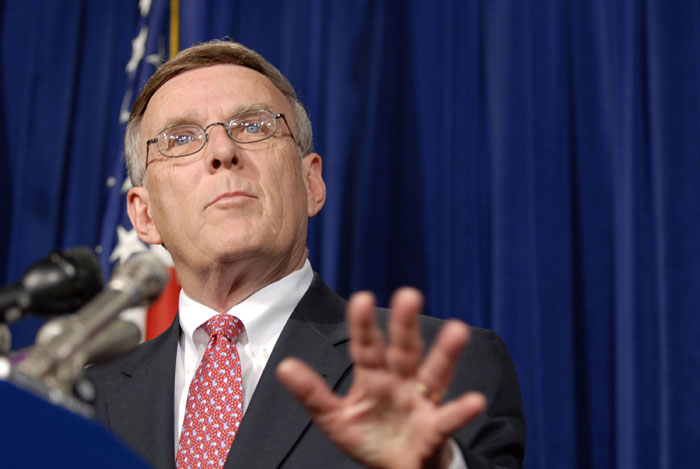Two Democrats–Sens. Russ Feingold (D-WI) and Maria Cantwell (D-WA)–once again joined the GOP in an attempt to filibuster Wall Street reform, on the grounds that the bill does too little to regulate big financial institutions. But the Democrat who most vocally threatened to block the bill–Sen. Byron Dorgan (D-ND)–ultimately chose not to, and in a way became the deciding vote. Democratic leaders needed 60 votes to break the filibuster, and without Dorgan they would have had only 59.
Why the change of heart? Dorgan cited two things when I asked him: his ability to force a vote on his flagship financial issue–banning naked credit default swaps–and the fact that, ultimately, he didn’t want to stand in the way of a bill he thinks makes some, though not sufficient, progress.
“I forced a vote on naked credit default swaps–banning naked credit default swaps,” Dorgan told me after casting in with his party. Dorgan’s amendment was tabled, but he regards the vote on a motion to table as a referendum on the legislation itself. Those 57 senators who voted to table his legislation were, in effect, voting against it.
But ultimately, he simply wasn’t interested in killing it. “This bill is short of what Congress should do, but it moves in the right direction, although it moves less aggressively than I would like to see it move,” Dorgan added. “Unlike some years ago when the issue was a piece of legislation, Gramm-Leach-Bliley, was I think just fundamentally wrong. I was very interested in stopping it. In this case I’m very interested in starting a piece of legislation that is constructively financial reform.”
The 1999 Gramm-Leach-Bliley act allowed major financial institutions of all different strips–from insurance companies to investment banks–to consolidate, and many believe it contributed in a fundamental way to the financial crisis in 2008.
One aide suggested that a caucus meeting yesterday afternoon Democratic leaders prevailed upon Dorgan and several other senators, including Carl Levin (D-MI) and Jeff Merkley (D-OR), not to block the bill. Dorgan disputed this.
Despite Feingold’s and Cantwell’s defections, the Democratic caucus overwhelmingly supports the bill, and even those who think it doesn’t do enough say it will be an improvement over the status quo. But there is fairly deep disenchantment among progressive members, who say that it will not ultimately forestall another taxpayer-funded bailout when a major financial crisis strikes again.
“I think this is a step forward, there’s no question about that,” Sen. Bernie Sanders (I-VT) told reporters after today’s vote. “I think it brings much greater regulation, I think it brings much greater transparency. But I think, frankly, it is nowhere near as strong as it could be. I think at the end of the day we are going to have to address the need to break up these very very huge financial institutions, which I believe, that if they start teetering in the future they will have to be bailed out, and that’s why you ought to break them up now.”
Dorgan agrees. “As long as our country has financial institutions too big to fail, I think you’re going to have failure,” Dorgan told me. “And I think ultimately the taxpayers will be called upon to bail them out.”










